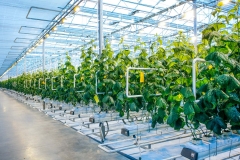
FACULTY OF BUSINESS
Department of Economics
ECON 322 | Course Introduction and Application Information
| Course Name |
Economics of Technology
|
|
Code
|
Semester
|
Theory
(hour/week) |
Application/Lab
(hour/week) |
Local Credits
|
ECTS
|
|
ECON 322
|
Fall/Spring
|
3
|
0
|
3
|
4
|
| Prerequisites |
|
|||||||||
| Course Language |
English
|
|||||||||
| Course Type |
Elective
|
|||||||||
| Course Level |
First Cycle
|
|||||||||
| Mode of Delivery | - | |||||||||
| Teaching Methods and Techniques of the Course | - | |||||||||
| Course Coordinator | - | |||||||||
| Course Lecturer(s) | - | |||||||||
| Assistant(s) | - | |||||||||
| Course Objectives | This course is an introduction to the economic analysis of science and technology. Attention is mostly focused on the microeconomics of innovation, even though important macroeconomic subjects will be covered as well. |
| Learning Outcomes |
The students who succeeded in this course;
|
| Course Description | Scientific and technological advances are among the most important determinants of economic growth, and the human condition at large. Invention is as old as humanity itself, and it has shaped the economic and social history of ancient humans as well as modern societies. This class starts by covering a brief history of modern invention, with special attention to the Industrial Revolution, and the evolution of some important industries. Then, the student is introduced to the contemporary economic literature on scientific and technological innovation. Starting with the problems of the measurement of scientific and technological output, the course covers important topics in the field, giving priority to empirical problems. Knowledge spillovers are covered with some detail, including their measurement, and mechanisms that cause and facilitate spillovers. The material covered here lends itself naturally to the diffusion and adoption of new technology, and the geography of invention, both of which are adopted as part of the class. We then cover in detail the usage of patents as the “data” for economic studies. The course ends with treatments of endogenous growth models, the effects of competition on innovation, and a discussion of the Schumpeterian Hypothesis. |
|
|
Core Courses | |
| Major Area Courses | ||
| Supportive Courses |
X
|
|
| Media and Management Skills Courses | ||
| Transferable Skill Courses |
WEEKLY SUBJECTS AND RELATED PREPARATION STUDIES
| Week | Subjects | Related Preparation |
| 1 | Historical background | Reading list. |
| 2 | Issues with the measurement of innovation | Reading list. |
| 3 | Returns to R&D and patenting | Reading list. |
| 4 | Knowledge Spillovers, Pt. 1: Introduction and a review of the literature | Reading list. |
| 5 | Knowledge Spillovers, Pt. 2: Scientific mobility and networks | Reading list. |
| 6 | Knowledge Spillovers, Pt. 3: FDI and the geography of invention | Reading list. |
| 7 | The diffusion of technology | Reading list. |
| 8 | Midterm | |
| 9 | Patent statistics as the data of invention | Reading list. |
| 10 | Endogenous growth models, Pt.1 | Reading list. |
| 11 | Endogenous growth models, Pt.2 | Reading list. |
| 12 | Innovation and competition | Reading list. |
| 13 | Schumpeterian hypothesis and some related themes | Reading list. |
| 14 | Additional topic (Optional and Time Permitting) | Reading list. |
| 15 | Additional topic (Optional and Time Permitting) | Reading list. |
| 16 | Additional topic (Optional and Time Permitting) | Reading list. |
| Course Notes/Textbooks | Reading list. The main material will consist of scientific articles and book chapters that will be announced. Each week's reading material will be available from the stationary store (copy center) on the base floor of bulding A. Most frequently used books and reading recommendations are listed below. |
| Suggested Readings/Materials | (1) Chris Freeman and Luc Soete, The Economics of Industrial Innovation (Third Edition), The MIT Press. (2) Suzanne Scotchmer, Innovation and Incentives, The MIT Press. (3) Dominique Foray, The Economics of Knowledge, The MIT Press. (4) Christopher Freeman, Francisco Louçã, As Time Goes by: From the Industrial Revolutions to the Information Revolution, Oxford University Press [this is the book that will be the subject of your end-of-year presentations]. |
EVALUATION SYSTEM
| Semester Activities | Number | Weigthing |
| Participation |
1
|
10
|
| Laboratory / Application | ||
| Field Work | ||
| Quizzes / Studio Critiques | ||
| Portfolio | ||
| Homework / Assignments |
1
|
30
|
| Presentation / Jury |
1
|
15
|
| Project |
3
|
45
|
| Seminar / Workshop | ||
| Oral Exams | ||
| Midterm | ||
| Final Exam | ||
| Total |
| Weighting of Semester Activities on the Final Grade |
65
|
|
| Weighting of End-of-Semester Activities on the Final Grade |
35
|
|
| Total |
ECTS / WORKLOAD TABLE
| Semester Activities | Number | Duration (Hours) | Workload |
|---|---|---|---|
| Theoretical Course Hours (Including exam week: 16 x total hours) |
16
|
3
|
48
|
| Laboratory / Application Hours (Including exam week: '.16.' x total hours) |
16
|
0
|
|
| Study Hours Out of Class |
0
|
||
| Field Work |
0
|
||
| Quizzes / Studio Critiques |
0
|
||
| Portfolio |
0
|
||
| Homework / Assignments |
4
|
4
|
16
|
| Presentation / Jury |
1
|
6
|
6
|
| Project |
1
|
20
|
20
|
| Seminar / Workshop |
0
|
||
| Oral Exam |
0
|
||
| Midterms |
0
|
||
| Final Exam |
20
|
0
|
|
| Total |
90
|
COURSE LEARNING OUTCOMES AND PROGRAM QUALIFICATIONS RELATIONSHIP
|
#
|
Program Competencies/Outcomes |
* Contribution Level
|
||||
|
1
|
2
|
3
|
4
|
5
|
||
| 1 | To be able to acquire a sound knowledge of fundamental concepts, theories, principles and methods of investigation specific to the economic field. |
X | ||||
| 2 | To be able to apply adequate mathematical, econometric, statistical and data analysis models to process economic data and to implement scientific research for development of economic policies. |
X | ||||
| 3 | To be able to participate in academic, professional, regional, and global networks and to utilize these networks efficiently. |
X | ||||
| 4 | To be able to have adequate social responsibility with regards to the needs of the society and to organize the activities to influence social dynamics in line with social goals. |
X | ||||
| 5 | To be able to integrate the knowledge and training acquired during the university education with personal education and produce a synthesis of knowledge one requires. |
|||||
| 6 | To be able to evaluate his/her advance level educational needs and do necessary planning to fulfill those needs through the acquired capability to think analytically and critically. |
X | ||||
| 7 | To be able to acquire necessary skills to integrate social dynamics into economic process both as an input and an output. |
X | ||||
| 8 | To be able to link accumulated knowledge acquired during the university education with historical and cultural qualities of the society and be able to convey it to different strata of society. |
|||||
| 9 | To be able to take the responsibility as an individual and as a team member. |
|||||
| 10 | To be able to attain social, scientific and ethical values at the data collection, interpretation and dissemination stages of economic analysis. |
X | ||||
| 11 | To be able to collect data in economics and communicate with colleagues in a foreign language ("European Language Portfolio Global Scale", Level B1) |
|||||
| 12 | To be able to speak a second foreign at a medium level of fluency efficiently. |
|||||
| 13 | To be able to relate the knowledge accumulated throughout human history to their field of economics. |
|||||
*1 Lowest, 2 Low, 3 Average, 4 High, 5 Highest
NEWS |ALL NEWS

Elif’s boundless success
Elif Larende (22), who graduated from Izmir University of Economics (IUE) Faculty of Business, Department of Economics with the second place this

‘Digital waiter’ ranks third
Mehmet Güler, a student of Izmir University of Economics (IUE) Department of Economics, came third in the ‘Akıl Fikir Yarışması’ (Idea Competition)

'Raspberry' ranks second in Turkey
Izmir University of Economics (IUE) Department of Economics student Mehmet Güler came in second in Turkey with his project called 'Raspberry' aimed
